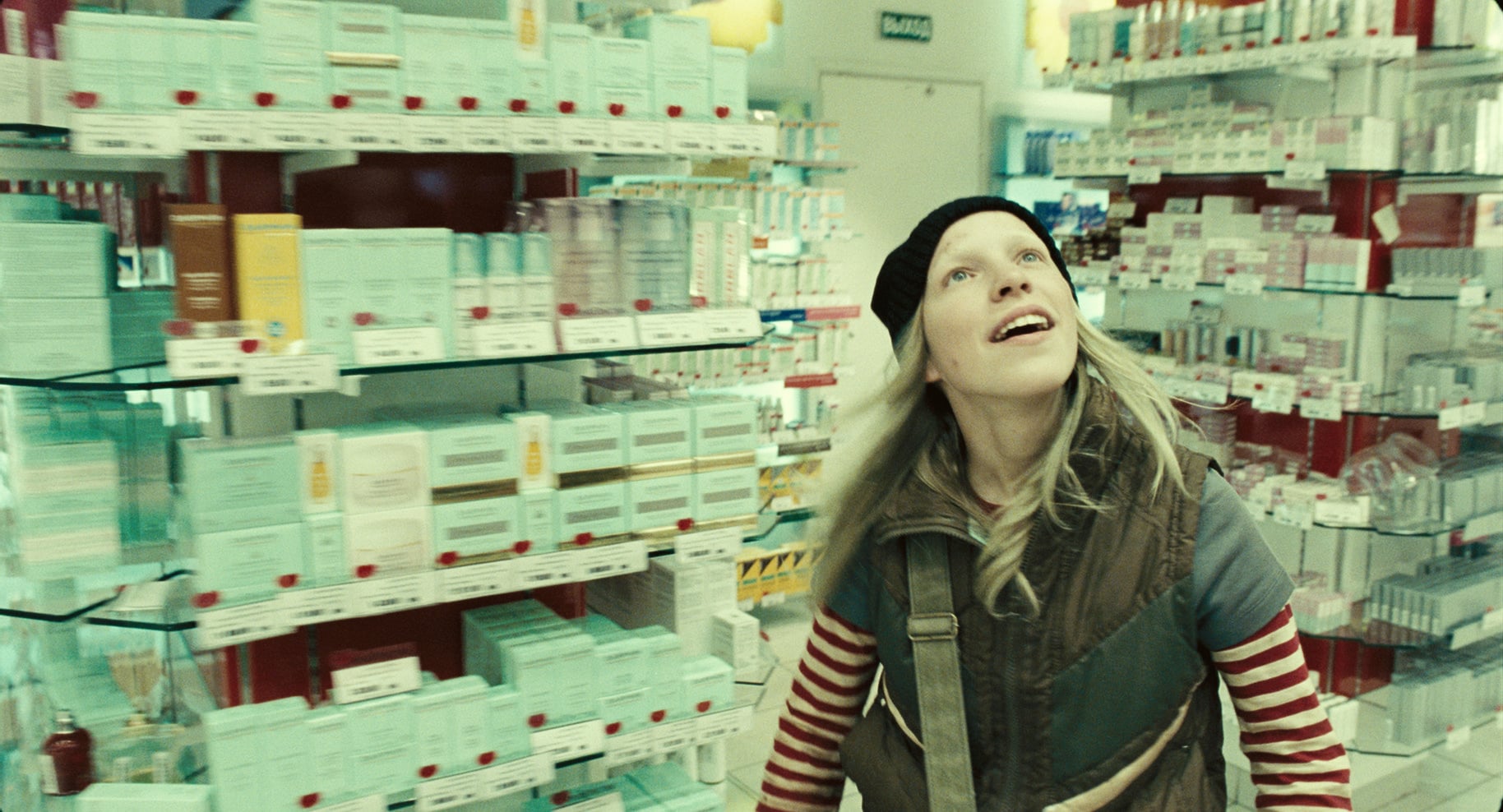Русалка (Mermaid) is a 2007 Russian arthouse film very loosely inspired by Hans Christian Anderson’s “The Little Mermaid.” It follows the tale of an eccentric and determined young girl as she ventures from her small beach town by the Black Sea to contemporary Moscow and adjusts to life in the bustling city while pursuing an unusual and complicated relationship with her “prince.” It was the second feature drama-comedy released by famed Armenian-Russian director, Anna Melikyan.
This article will overview the plot, themes, and cultural context of Mermaid, as well as give advice for intermediate level Russian speakers hoping to view the film.
It is available for free with English subtitles on vimeo.
See the trailer here:
Synopsis of Mermaid
The introverted, yet ambitious main character, Alisa, believes she has a connection to the sea that grants her the ability to make wishes come true. Her selfish and man-obsessed mother struggles to keep the household afloat as a single mom. Her father was a sailor with whom her mother apparently had a one night stand. Through her vanity and overbearing nature, she crushes most of Alisa’s dreams. When Alisa finds that she has been with another sailor, she burns their beach shack down to the ground in a fit of rage, viewing her mother’s tryst as a betrayal to her father.
The film flashes forward to the day of an eclipse when six year old Alisa decides to become completely silent, only turning to the sea to speak her wishes into existence. In response to her silence, Alisa’s mother enrolls her in a boarding school for kids with disabilities where she remains until she is seventeen. Then, fed up with her mother’s self-absorption and the limitations of village life, seventeen year old Alisa wishes to leave her town and curses it, causing (or so she thinks) a hurricane to destroy her village. Alisa, her mother, and her grandmother set off for Moscow, as, her mother says, “when people don’t have anywhere to go, they go to Moscow.”
In Moscow, mute Alisa is immediately greeted by a wave of consumerism and scampers around the megatropolis, marvelling after the large billboards, towering buildings, and massive crowds. She works first in a light bulb factory, and then handing out advertising flyers on the street. On a whim, she takes a university placement test, but ranks just below where she would need for acceptance. She wishes to get in and, at that moment, one of the accepted students gets hit by a car and dies, opening up a spot for Alisa. Terrified by her ability to do harm, Alisa vows to never make a wish again… until she meets Aleksandr.
The male protagonist of Mermaid and Alisa’s unrequited love interest, Aleksandr, is a wealthy businessman. The two meet when Aleksandr, staggering drunk, jumps in a river. Alisa dives in after him, saving him and, entranced by his beauty, speaks her first words since the age of six: “I’m Alisa.” She gets him home, head over heels in love with him, and stays in his apartment that night. In the morning, however, Aleksandr doesn’t remember the previous evening and mistakes her for a cleaning lady.
To stay in his life, Alisa works for Aleksandr as his housekeeper and regularly saves him from disaster. Aleksandr seems to grow fond of her, but won’t admit it, apparently deeming it unworthy because of their class distinctions. He continues to date a beautiful city-born girl whom he seems to value less than his fish. Heartbroken Alisa wishes death upon Aleksandr but, upon realizing what she has done, begs him not to take a flight he is scheduled for. She lies and tells him that her grandmother has died in his apartment, finally getting him to turn around from the airport. Shortly thereafter, he learns that his flight crashed, leaving no survivors.
Grinning from her feat, Alisa steps into a crosswalk and is violently struck by a speeding car. Searching for her, Aleksandr is stopped in his tracks when he runs into his beautiful girlfriend. When asked who he is looking for, Aleksandr embraces the girl and tells her “you.” Alisa’s mop of green hair lays flat on the concrete above her sprawled body, as her voice narrates: “2,000 people die in Moscow every day.”
Viewing Mermaid at an Intermediate High Proficiency Level (Without Subtitles)
While you won’t be able to understand every word or some of the nuanced character growth and relationships pictured in the film, you will be able to easily pick up on the plot when watching Mermaid at the intermediate level. Thanks to Melikyan’s talent of exquisitely capturing the themes and plot development of her films through cinematography and even scoring, context clues are abundant in Mermaid.
The main theme (commercialism in Moscow) is captured through well placed shots of various advertisement billboards, landmarks, cars, etc. and thus can be recognized even with no understanding of Russian at all. However, the words pictured on the advertisements actually relate to the events of Mermaid, so I recommend either pausing the film to read the signs during these moments or watching the film a second time with subtitles.
The main character, Alisa, is also for the most part easy to understand, as she not only is silent for much of the film, but, when she does speak, her voice is clear and slow. She, and other characters in the film, also use a significant amount of cognates and simple conversational language when they speak, including words like: рыбка, человек, вот, любить, балерина, среда, хор, дома, здравствуйте, спасибо, делать, ждать, стресс, телефон, and паспорт.
Some characters, however, are harder to understand. The university student she meets during testing, for instance, speaks very quickly. Alisa’s mother also speaks quickly and abruptly and can be difficult to understand (although it is perfectly clear how horribly she treats Alisa).
For a more nuanced understanding of the film as a whole, I would recommend both learning some important more advanced vocabulary in advance, such as: русалка (mermaid), давным-давно (long ago), свидание (date), моряк (sailor), прятаться (imperfective form; to hide), молчать (imperfective form; to be silent), корабль (ship), обещать (imperfective form; to promise), мужчина (man), опаздывать (imperfective form; to be late), сдать (used in the film as “to rent”), исполнять желание (verb: perfective form; to make wishes come true), предатель (traitor), сдохнуть (perfective form; directly: to croak, but more accurately means “to die”), затмение (eclipse), заметить (perfective form; to notice), виновать (to blame), трубка (phone), погибнуть (perfective form; to perish: used when someone dies in a horrible way like a car accident), уборщица (cleaning lady), and трогать (to touch).
Analysis of Mermaid
Perhaps Anna Melikyan’s most successful film, Mermaid grossed about $1.5 million, which is a solid performance for a Russian arthouse film. It was chosen as Russia’s entry for the 2009 Academy Awards, although it did not win. Awards it did win include: FIPRESCI Prize for Panorama at The Berlin International Film Festival in 2008; Grand Prix for Best Film at Golden Apricot Yerevan International Film Festival in 2008; Independent Camera Prize at Karlovy Vary International Film Festival in 2008; Best Actress (Mariya Shalayeva) at Nika Awards 2008; Grand Prix for its achievements in art direction, cinematography, decoupage production, acting, and its play for energy and invention at the Sofia International Film Festival 2008; Directing Award for World Cinema (Drama) at the Sundance Film Festival 2008; Best Actress (Mariya Shalayeva) at the Sochi Open Russian Film Festival 2007.
The success of Mermaid is reflected in its reviews as well, earning ratings of 7.3/10 on IMDb, 7.1/10 on KinoPoisk, and 3.6/5 on Letterboxd.
In Mermaid, the theme of illusion is closely tied to Melikyan’s portrayal of Moscow as a whole. For much of history, Russian people have pointed at artistic, refined Saint Petersburg as the prime example of Russian excellence and development. However, their focus has shifted in the post-Soviet age to the extremely commercialized and technologically advanced Moscow. Melikyan captures this image by showering her audience with shots of famous landmarks, massive advertisement billboards, towering buildings, and high-speed cars. However, she also challenges this viewpoint by portraying Moscow through the lense of an average citizen living there, including images like the gray cramped apartment building Alisa lives in and the workers in the lightbulb factory.
Melikyan also looks at a related, but more person theme: empty self-presentation. The character Aleksandr is pictured wearing sleek black suits, driving an expensive black car, living in a gray-themed flat which more closely resembles a catalogue picture than a home. He throws parties for his elite friends every weekend to show his status, but in so doing, endangers his own life through his reckless, alcohol-driven behavior. In peeling away Aleksandr’s shell during his scenes with Alisa, Melikyan comments on the emptiness below the facade.
For anyone hoping to not only enhance their Russian listening skills, but also deepen their understanding of Russia’s capital and the current elite class living there, Mermaid is the perfect place to start. Not to mention, the exquisite cinematography and scoring of this award-winning film can be appreciated at any proficiency level.
It is available for free with English subtitles on vimeo.











